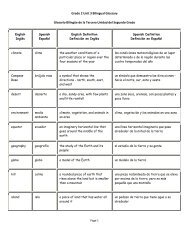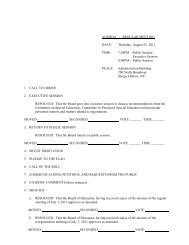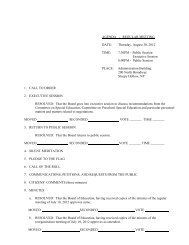Remembering Who We Are: Observations of a Southern Conservative
Remembering Who We Are: Observations of a Southern Conservative
Remembering Who We Are: Observations of a Southern Conservative
You also want an ePaper? Increase the reach of your titles
YUMPU automatically turns print PDFs into web optimized ePapers that Google loves.
364 ISSUE16 / WasAbraham LincolnAmerica'sGreatestPresident?<br />
future obligations to the Negro, slave and free. It was <strong>of</strong> course an essential<br />
ingredient <strong>of</strong> Lincoln's position that he make a success at being anti-<strong>Southern</strong><br />
or antislavery without at the same time appearing to be significantly impious<br />
about the beginnings <strong>of</strong> the Republic (which was neither anti-<strong>Southern</strong> nor<br />
antislavery)-or significantly pro-Negro. He was the first Northern politician<br />
<strong>of</strong> any rank to combine these attitudes into a viable platform persona, the first<br />
to make his moral position on slavery in the South into a part <strong>of</strong> his national<br />
politics. It was a posture that enabled him to unite elements <strong>of</strong> the Northern<br />
electorate not ordinarily willing to cooperate in any political undertaking. And<br />
thus enabled him to destroy the old Democratic majority-a coalition necessary<br />
to preserving the union <strong>of</strong> the states. Then came the explosion. But this<br />
calculated posturing has had more durable consequences than secession and<br />
the Federal confiscation <strong>of</strong> property in slaves....<br />
In the nation as a whole what moves toward fruition is a train <strong>of</strong> events<br />
set in motion by the duplicitous rhetoric concerning the Negro that helped<br />
make Abraham Lincoln into our first "sectional" president. Central to this<br />
appeal is a claim to a kind <strong>of</strong> moral superiority that costs absolutely nothing<br />
in the way <strong>of</strong> conduct. Lincoln, in insisting that the Negro was included in the<br />
promise <strong>of</strong> the Declaration <strong>of</strong> Independence and that the Declaration bound<br />
his countrymen to fulfill a pledge hidden in that document, seemed clearly<br />
to point toward a radical transformation <strong>of</strong> American society. Carried within<br />
his rejection <strong>of</strong> Negro slavery as a continuing feature <strong>of</strong> the American regime,<br />
his assertion that the equality clause <strong>of</strong> the Declaration <strong>of</strong> Independence was<br />
"the father <strong>of</strong> all moral principle among us," were certain muted corollaries.<br />
Bypromising that the peculiar institution would be made to disappear if candidates<br />
for national <strong>of</strong>fice adopted the proper "moral attitude" on that subject,<br />
Lincoln recited as a litany the general terms <strong>of</strong> his regard for universal human<br />
rights. But at the same time he added certain modifications to this high doctrine:<br />
modifications required by those <strong>of</strong> his countrymen to whom he hoped<br />
to appeal, by the rigid racism <strong>of</strong> the Northern electorate, and by "what his<br />
own feelings would admit." The most important <strong>of</strong> these reservations was that<br />
none <strong>of</strong> his doctrine should apply significantly to the Negro in the North. Or,<br />
after freedom, to what he could expect in the South. It was a very broad, very<br />
general, and very abstract principle to which he made reference. Byit he could<br />
divide the sheep from the goats, the wheat from the chaff, the patriot from<br />
the conspirator. But for the Negro it provided nothing more than a technical<br />
freedom, best to be enjoyed far away. Or the valuable opportunity to "root,<br />
hog, or die." For the sake <strong>of</strong> such vapid distinctions he urged his countrymen<br />
to wade through seas <strong>of</strong> blood.<br />
To be sure, this position does not push the "feelings" <strong>of</strong> that moralist<br />
who was our sixteenth president too far from what was comfortable for him.<br />
And it goes without saying that a commitment to "natural rights" which will<br />
not challenge the BlackCodes <strong>of</strong> Illinois, which promises something like them<br />
for the freedman in the South, or else <strong>of</strong>fers him as alternative the proverbial<br />
"one-way-ticket to nowhere" is a commitment <strong>of</strong> empty words. It is only an<br />
accident <strong>of</strong> political history that the final Reconstruction settlement provided<br />
a bit more for the former slave-principally, the chance to vote Republican;

















